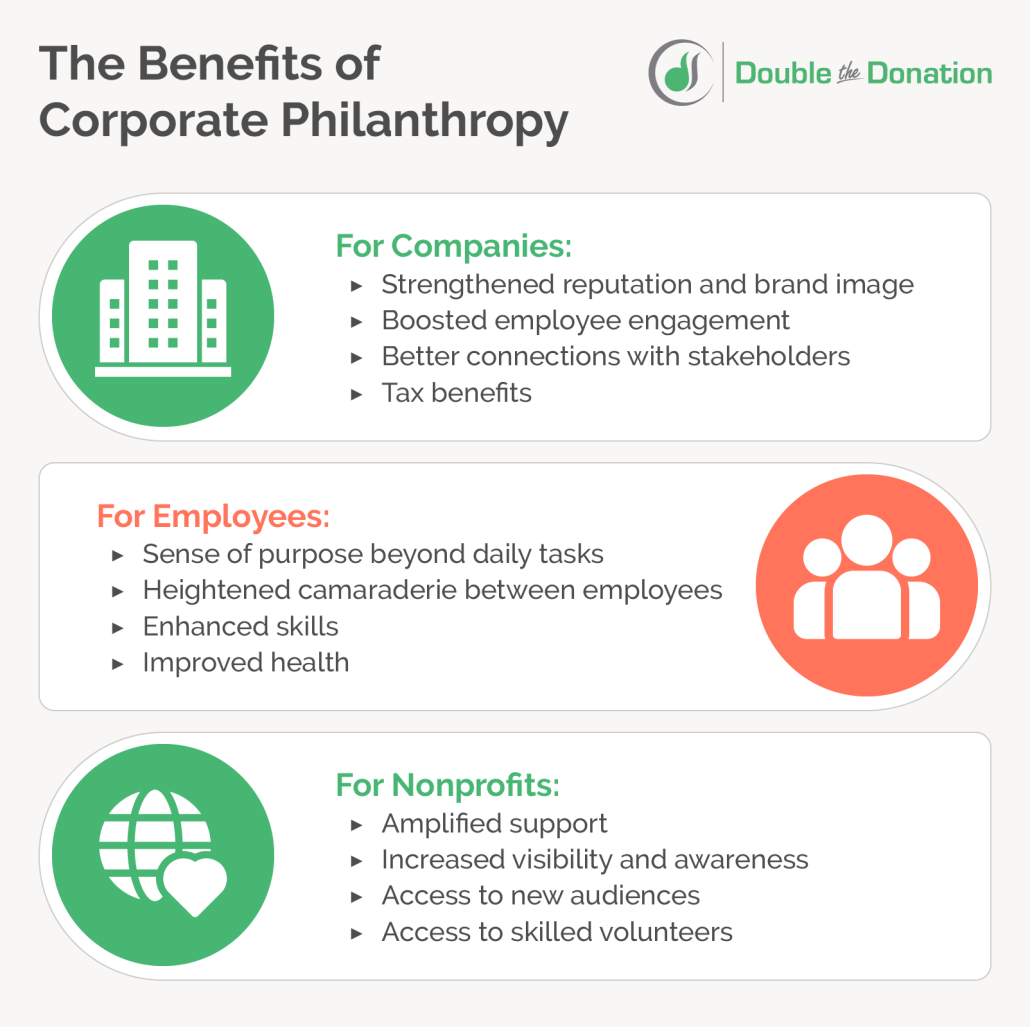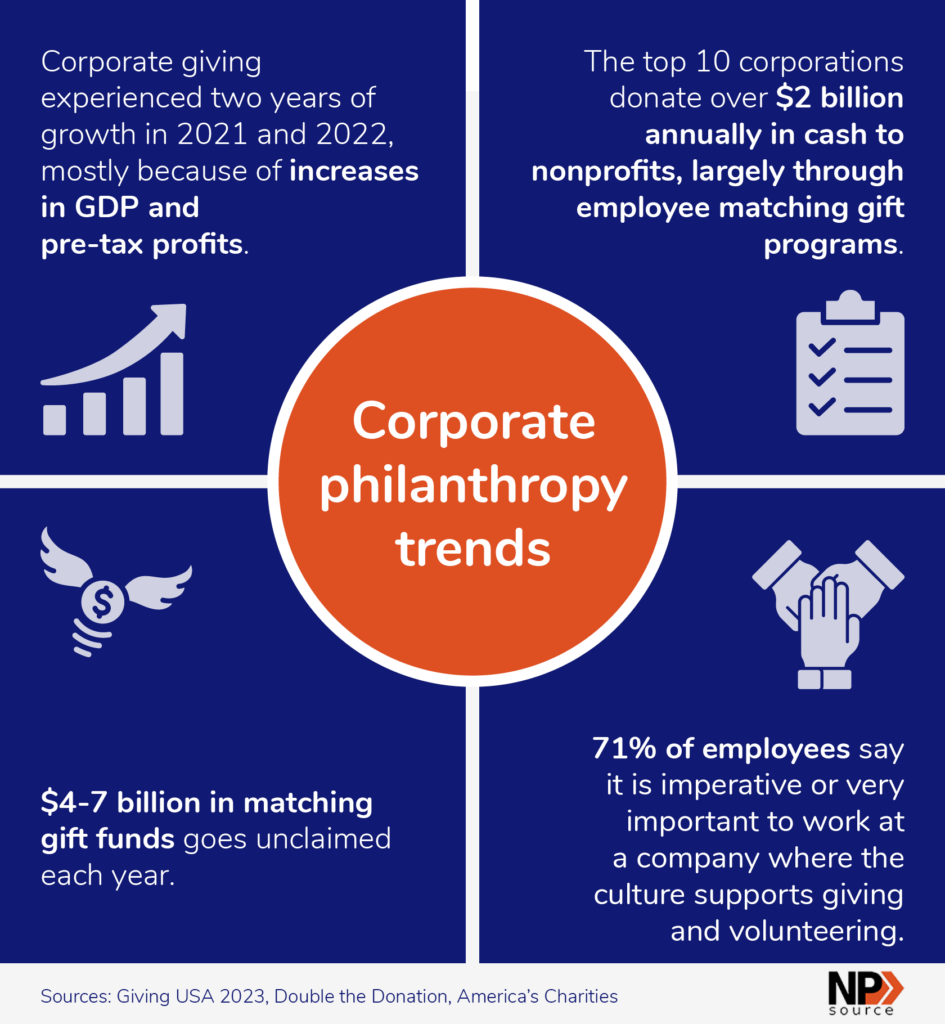Checking Out Just How Corporate Philanthropy Shapes Brand Name Online Reputation and Client Loyalty
Business philanthropy significantly influences brand credibility and client loyalty. Companies that involve in authentic philanthropic initiatives usually see a favorable shift in just how customers perceive them. This alignment of values promotes trust fund and psychological connections with audiences. Nevertheless, the efficiency of these kind efforts can differ greatly. Recognizing what absolutely resonates with consumers is essential for brand names seeking to enhance their social effect and market setting. What techniques will become necessary for future success?
The Evolution of Corporate Philanthropy
As companies increasingly recognize their role in culture, the development of company philanthropy has actually transformed from simple charitable contributions to a strategic component of brand name identity. Business engaged in philanthropy largely for tax benefits or to boost their public image. With time, this approach moved as stakeholders-- including customers, capitalists, and employees-- demanded an extra authentic dedication to social obligation.
Organizations started aligning their humanitarian efforts with their core worths and business objectives, bring about more thoughtful and impactful contributions. This change has actually encouraged companies to purchase lasting techniques and area advancement, promoting a sense of objective that resonates with consumers.
Technical developments have promoted openness and engagement, permitting companies to display their kind initiatives extra properly. Company philanthropy has actually arised as an important component of business technique, with companies accepting the chance to positively affect society while improving their general brand name story.
The Influence of Philanthropy on Brand Name Assumption
While firms participate in humanitarian initiatives to advertise social excellent, these campaigns greatly shape brand perception among customers. Corporate philanthropy can boost a brand name's picture by associating it with positive social influence and community participation. Consumers commonly view brand names that actively take part in charitable activities as even more trustworthy and accountable. This assumption can affect buying choices, as consumers might favor brands that show a dedication to social concerns.

Structure Emotional Connections Through Giving
Corporate philanthropy functions as an effective tool for improving brand name identity by linking company values with area demands. Via calculated giving, firms can promote community interaction and create common worths that reverberate with consumers on a psychological degree. This method not just enhances brand name online reputation however also builds long-term links in between businesses and their stakeholders.
Enhancing Brand Identity
When companies engage in philanthropic efforts, they not only add to social great but also forge deeper emotional connections with their audiences. By aligning their brand name with philanthropic reasons, firms enhance their identity and signal worths that reverberate with consumers. This placement develops a story that goes past items and services, inviting customers to join a shared mission. As customers significantly focus on purpose-driven brands, business that proactively take part in offering can distinguish themselves in a congested market. Such efforts promote a sense of commitment among clients that really feel personally linked to the brand's values. Inevitably, business philanthropy ends up being an important device for improving brand name identification, growing lasting relationships based on shared ideas and psychological engagement.
Fostering Neighborhood Engagement
Many researches suggest that business participating in community-focused humanitarian campaigns can considerably reinforce emotional links with their stakeholders. By investing in regional jobs and supporting social reasons, companies grow a feeling of belonging and count on within the neighborhood. This interaction promotes a favorable brand photo, as clients appreciate firms that show real concern for societal concerns. Furthermore, employees frequently feel much more determined and honored to be related to an organization that prioritizes area well-being. As a result, consumers are more probable to create loyalty towards brands that actively add to meaningful reasons. Ultimately, promoting area interaction with philanthropy not just enhances brand name credibility however also builds long-term emotional ties that benefit both the neighborhood and the business it offers.
Creating Shared Worths
How can companies successfully create common worths that reverberate with their stakeholders? Companies can achieve this by straightening their humanitarian initiatives with their core objective and the passions of their areas. By engaging in campaigns that address regional requirements, organizations promote psychological connections with customers, boosting brand name loyalty. Partnering with non-profits that show shared worths reinforces the brand's picture and demonstrates commitment to social duty. Additionally, clear interaction regarding these initiatives enables stakeholders to see the substantial effect of their contributions. Eventually, by incorporating shared worths right into their corporate philanthropy, firms not just improve their track records but likewise cultivate long lasting relationships with consumers, causing enhanced commitment and trust. This placement is necessary in modern-day consumer decision-making.
Situation Studies: Effective Philanthropic Campaigns
Checking out effective kind campaigns exposes various techniques that enhance brand name credibility. Impactful community efforts, innovative collaboration versions, and long-term involvement strategies have actually confirmed effective in cultivating favorable connections with customers. These case researches highlight the value of thoughtful company giving up achieving both social and business goals.
Impactful Neighborhood Initiatives
Many firms have efficiently leveraged kind campaigns to boost their brand name online reputation while making a meaningful impact in their neighborhoods. As an example, an innovation firm launched a digital literacy program in underserved neighborhoods, supplying training and resources that encouraged neighborhood homeowners. This initiative not only added to community advancement yet also placed the firm as a socially responsible leader. Likewise, a significant food firm implemented an appetite relief campaign, partnering with regional nonprofits to disperse meals to family members in need. This effort enhanced area ties and promoted client loyalty. Via these impactful campaigns, business have actually demonstrated their commitment to social duty, efficiently straightening their brand name values with the needs of the areas they offer, eventually boosting their general reputation.
Ingenious Partnership Versions
The success of impactful neighborhood initiatives commonly rests on innovative partnership models that unite varied stakeholders to deal with facility social difficulties. Instance researches illustrate how companies, non-profits, and government entities can team up efficiently. As an example, a multinational corporation partnered with a regional charitable to launch an education program, pooling resources and knowledge to improve community literacy prices. An additional example involved a tech business and a medical care organization signing up with pressures to create a telemedicine remedy for underserved populations. These collaborations not just intensified the reach of kind initiatives yet likewise strengthened the brands' credibilities by aligning their objectives with area requirements. Eventually, innovative collaboration models offer as a catalyst for purposeful change and foster stronger links between brand names and their customers.
Long-term Involvement Methods

Measuring the ROI of Company Social Responsibility
As firms increasingly invest in business social duty (CSR) efforts, comprehending the return on investment (ROI) related to these initiatives becomes crucial. Measuring ROI in CSR is diverse, often including both qualitative and quantitative metrics. Financial returns can be evaluated through increased sales, improved brand commitment, and enhanced worker morale, which can lead why not find out more to higher performance. Furthermore, firms might analyze cost financial savings connected to lasting methods, such as lowered waste or power intake.
Qualitatively, the impact of CSR on brand reputation can be evaluated with customer understanding research studies and social media sentiment analysis. Studies can give insights into just how CSR tasks affect consumer commitment and trust fund. Benchmarking against industry requirements can help organizations determine their CSR efficiency - corporate philanthropy. Ultimately, a complete method to determining ROI enables firms to make enlightened choices regarding future CSR financial investments, straightening approaches with both financial performance and social impact
Consumer Expectations and Business Responsibility
Progressively, customers expect firms to run with a strong sense of corporate obligation, checking out moral methods as a prerequisite for brand commitment. This shift in expectation reflects an expanding awareness of social and environmental concerns, leading clients to prefer brands that straighten with their values. Customers are much more inclined to sustain firms that engage in clear methods, show sustainability, and contribute positively to their areas.
Moreover, social media sites magnifies these expectations, allowing customers to share their viewpoints and experiences quickly. Brands that fail to satisfy these ethical standards take the chance of reaction, while those that accept corporate responsibility usually take pleasure in superior credibility and customer loyalty. As consumers require liability, firms must integrate company social duty into their core approaches, prioritizing honest habits not just as a marketing approach, but as a fundamental aspect of their procedures. This placement can inevitably lead to stronger brand name affinity and continual success in competitive markets.
Future Trends in Business Philanthropy and Brand Name Loyalty
The landscape of company philanthropy is evolving, affected by the intense customer expectations bordering corporate obligation. Business are increasingly incorporating social influence right into their core business approaches, not merely as a secondary activity. Future fads indicate a change toward transparency, with brands sharing in-depth details regarding their kind campaigns and their straight results on neighborhoods.
Technology is playing a vital duty, allowing real-time engagement in that site between consumers and brands. Social media site systems help with direct communication, allowing consumers to voice their assumptions and hold brand names answerable. In addition, more youthful generations, particularly Millennials and Gen Z, focus on sustainability and honest practices, driving companies to take on even more diligent approaches.
As business philanthropy ends up being identified with brand name identity, business that authentically straighten their objectives with societal needs are most likely to cultivate stronger customer loyalty. This merging of worths will ultimately form the future of business credibility and consumer partnerships in a significantly conscientious market.
Regularly Asked Concerns
How Do Customers Discover a Business's Philanthropic Initiatives?
Customers discover a company's humanitarian efforts via numerous networks, including social media sites, news release, area events, and word-of-mouth. These methods facilitate understanding, making it possible for people to involve with brand names that straighten with their values and rate of interests.
What Function Does Employee Involvement Play in Business Philanthropy?
Employee involvement in business philanthropy enhances involvement, promotes a sense of ownership, and strengthens group cohesion - corporate philanthropy. This participation usually magnifies the effect of philanthropic efforts, resulting in greater awareness and assistance for the firm's philanthropic initiatives
Can Corporate Philanthropy Backfire on a Brand's Online reputation?
Corporate philanthropy can undoubtedly backfire on a brand's credibility if regarded as insincere or opportunistic. Unfavorable public assumption might emerge, resulting in decreased trust fund and commitment amongst customers who prioritize authenticity in company actions.
Are Smaller Sized Business as Effective in Philanthropy as Larger Corporations?
Smaller companies can be similarly efficient in philanthropy as bigger firms, usually showing dexterity and authenticity. Their local efforts may resonate much more deeply with areas, cultivating real connections despite limited sources compared to their bigger counterparts.
Exactly How Can Companies Select the Right Creates to Support?
Business can select the ideal bring on by straightening their worths with community demands, analyzing stakeholder passions, and examining prospective effect. This critical approach promotes credibility, enhances interaction, and strengthens connections with consumers and the broader neighborhood.
While companies engage in kind efforts to advertise social excellent, these campaigns greatly form brand name assumption among consumers. As customers progressively focus on purpose-driven brands, business that proactively engage in giving can distinguish themselves in a crowded market. Numerous companies have effectively leveraged philanthropic campaigns to enhance their brand credibility while making a meaningful effect in their neighborhoods. Significantly, customers expect companies to run with a strong sense of corporate duty, watching moral techniques as a requirement for brand loyalty. As business philanthropy ends up being associated with brand click this name identification, business that authentically straighten their goals with societal demands are likely to promote more powerful client commitment.